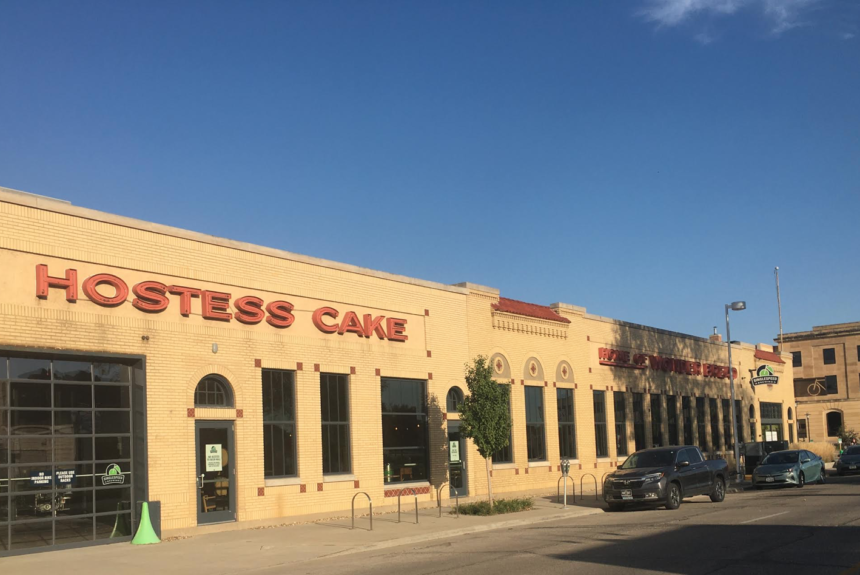By Amber Todoroff
The Wonder Bread building in downtown Waterloo, Iowa, spans an entire block. The 30,000-square-foot space was a bustling economic hub between 1927 and 2012, filling the town with the delicious scent of freshly baked treats. After the factory was shuttered amid Hostess bankruptcy proceedings in 2012, the Spanish Revival-style building sat empty, accumulating graffiti and maintenance bills.
Today, the building has found a new life as a SingleSpeed Brewing restaurant, brewery, and retail center. And the historic character of the neighborhood isn’t the only thing the new business is saving—SingleSpeed has made strides in reducing the building’s carbon footprint by offsetting brewery operations with rooftop solar panels and by installing electric vehicle charging stations in the restaurant’s parking lot.
Protecting and adapting the historic building came about thanks to partnerships between local advocates, private businesses, and city, state, and federal programs. The city acquired the building in 2014 for $400,000, after conducting an environmental review to test for chemicals or other substances that might impact redevelopment decisions. As city officials contemplated new plans for the space, concerned citizens formed a group called “Friends of the Waterloo Wonder Bread Building” to advocate for its preservation and to attract a new business to the building.
The group reached out to Dave Morgan, CEO of SingleSpeed Brewing, Co., who happened to be looking to expand operations outside of neighboring town Cedar Falls. According to Rachel Beck, Sustainability Coordinator and Social Media Manager at SingleSpeed, the timing and location made for a perfect opportunity for the business.
“The building kind of fell into SingleSpeed’s lap. It was vacant at the time, on the calendar for demolition. And it was brought to our attention by a lot of people in the community that just didn’t want to see the building torn down and turned into a parking lot,” she said. “It was perfectly suited for our needs at the time.”
Redevelopment plans were effectuated through a deal drawn up by the City of Waterloo. The city donated the building and $160,000 to SingleSpeed, along with a promise to rebate 70 percent of property taxes for 15 years. In exchange, SingleSpeed agreed to renovate the property and maintain at least $3 million in assessed value.
The State Historic Preservation Office of Iowa and the National Park Service were also involved in project funding. NPS Rehabilitation Tax Credits were used to offset 20 percent of the costs associated with the repair or structural improvement of architectural features of the building. A similar state program provided an additional 25 percent of qualified cost tax credits.
“I know that adding the National Park Service and the State Historic Preservation Society to a construction project didn’t necessarily simplify things,” Beck reflected. “But at the end of the day, it was ultimately a better product, and the funding provided a lot for us to properly preserve the history of the building, while also creating a really awesome brewery and restaurant inside the building.”
While adapting the building for use as a modern brewery and restaurant, architects and project managers also designed and installed a solar array generating 103 kilowatts/hour of energy on the building’s roof. This installation offsets nearly 100 percent of the brewing operation, which accounts for about 16 percent of the building’s total energy usage.
This project and initiatives to improve energy efficiency—such as installing LED lights and motion sensors and timers for production machinery—helped earn the building a LEED Gold certification, along with multiple awards for achievements in the adaptive reuse of historic property. All told, the modeled energy savings and solar production for the project are 198 metric tons of CO2e a year, equivalent to taking 42.7 cars off the road.
According to Beck, sustainability is a part of everyday business operations as well. The company composts 100 percent of kitchen and post-consumer food waste, and sources ingredients from local farmers whenever possible. Employees are eligible for “green perks,” a program in which staff earn gift certificates for environmentally-friendly activities like using reusable water bottles, biking to work, or shopping with reusable bags. Spent grain is sent to a local farmer to be used as cattle feed, and the company ships its products in 100 percent post-consumer recycled cardboard.
Efforts to adapt and reuse the historic building were widely appreciated by the local community.
“No one wanted to see the factory get torn down. It was a very real piece of history for the city of Waterloo,” said Beck. “When we first opened the doors, we had a lot of Wonder Bread employees come in to take a look at the place, and they recognized their own workstations just from the spots in the floor, or they recognized some brick wall that they used to stand by. And it’s just really cool to see how much of the history of the building is still retained.”
Amber Todoroff is a Senior Policy Associate at the Environmental and Energy Study Institute.
The views and opinions expressed are those of the author’s and do not necessarily reflect the official policy or position of C3.
